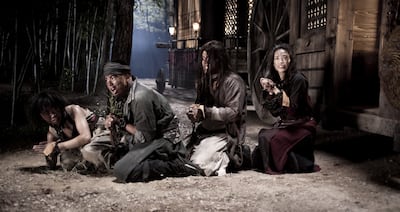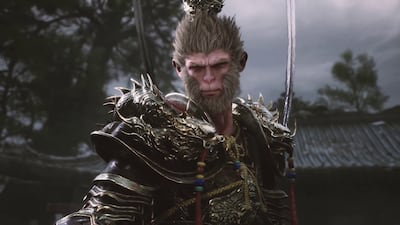A new video game called Black Myth: Wukong has become a phenomenon after its release. Developed and published by Chinese studio Game Science, it recently reached 2.2 million concurrent players on the platform Steam, breaking the record for the highest number of concurrent players for a single-player game.
Black Myth: Wukong is particularly popular in its home country China, becoming the most-streamed game during its first day of release on August 19. During its first week, the game also boosted sales for the PlayStation 5 in China.
Last week, Game Science announced they had sold 10 million copies of the game and achieved three million concurrent players across all platforms, making it a runaway success. But what is Black Myth: Wukong? And why has it become so popular among gamers?

Black Myth: Wukong is adapted from the Chinese novel Journey to the West, which was first published in 1592. Written by Wu Cheng'en, the book is based on the seventh century pilgrimage of the Buddhist monk Xuanzang (602–664) to India in search of sacred texts.
The main character in the game is Sun Wukong, who features in the novel and is described as a monkey king born from a stone who acquires supernatural powers through Taoist practices. The character possesses immense strength and speed, making him one of the earliest examples of a superhero.
Journey to the West has been a literary staple of China and the wider south-east Asian region since its publication. Throughout the years, many translations and have made their way across the continent. The first significant English version was done in 1942 by sinologist Arthur Waley.
The story has also been adapted into theatrical plays, operas, a long running television series and big blockbuster film epics. Here are some of the other most notable adaptations:
Dragon Ball (1984)

In 1984 Japanese manga artist Akira Toriyama created Dragon Ball, which was heavily inspired by Journey to the West. The Chinese novel served as the base story, with Toriyama substituting the characters with his own creations. The main character, Goku, for example, is a stand-in for Sun Wukong.
Toriyama’s intention was to take the blueprint set by Journey to the West and add Kung-fu elements to it, making it more exciting to new audiences in the 1980s. The result was, to put it mildly, an incredible success.
Dragon Ball’s 42 collected volumes have sold more than 160 million copies in Japan and 260 million copies worldwide, making it one of the best-selling manga series of all time. The manga also spawned a long-running cartoon series which also sprouted feature length films. Today, the Dragon Ball fandom finds strongholds not only in Asia but across Europe, the US and Mexico.
Journey to the West (1986)
One of the more memorable adaptations for Chinese audiences, this long-running television series produced by CCTV in 1986 can be found playing on TV in the background of any Chinese food eatery around the world.
The show stars Liu Xiao Ling Tong as Sun Wukong, a part that he would play for years between 1986 and 2000. He reprised the role for a new adaptation in 2010, making him the actor most associated with portraying the Monkey King character to Chinese audiences.
The first season of the show was intended to have 30 episodes but was cut down to 25 due to budget restraints. The five remaining episodes were the basis for the second season. The first season is a permanent fixture on Chinese television, airing several times every year and attracting more fans in the process.
Monkey (1978)
Another television adaptation is this one from Japan, which began in 1978 and continued until 1980. Produced by Nippon TV, 52 episodes were produced across two seasons. The show was even dubbed in English in 1979 for audiences in the UK, Australia and New Zealand.
The main character, Sun Wukong, was named Son Goku in Japanese and was portrayed by Masaaki Sakai. English actor David Collings dubbed the character in the English language version. Other notable names that contributed to the English language dub include Peter Woodthorpe, Andrew Sachs and Miriam Margolyes.
Journey to the West: Conquering the Demons (2013)

Hong Kong cinema's renowned Stephen Chow co-directs this adaptation alongside Chi-Kin Kwok. Chow, who is known for directing bombastic martial arts films such as Kung-fu Hustle and Shaolin Soccer, returned after a five-year hiatus to take on this adaptation.
This film is a good way to enjoy the story without committing to a long-running television show, presenting the tale of the Monkey King in Chow’s signature style of slapstick comedy and powerful fight scenes.
Upon its release in China on February 13, 2013, the film set several box office records, most importantly becoming the biggest first day opening by amassing $12.5 million in ticket sales. After its global release, Journey to the West: Conquering the Demons became the highest-grossing Chinese language film ever, taking in $215 million from ticket sales.


